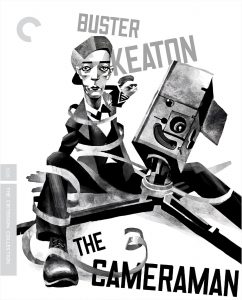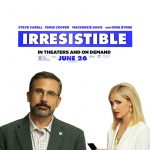
I find myself giggling when I watch Buster Keaton. Yes, I’m impressed by his elaborate sight gags and appreciate his brilliant physical bits and while I am taking these in, occasionally an irrepressible titter will escape my lips. This doesn’t happen when I watch Chaplin, Lloyd, Arbuckle or any of Keaton’s other contemporaries, all of whom I find amusing in their own right. But where Keaton’s concerned, there’s a bit more joy at play in his films and that’s one of the reasons they’ve endured and stayed fresh all of these years.
The Criterion Collection have done more than fair share to ensure that Keaton’s legacy and with the latest entry in their series, they look at Keaton’s last two great films before his career went into an irreversible decline. The Freshman was the first movie the filmmaker made for MGM after signing a lucrative contract that would temporarily solve some of his financial problems. Ultimately however, the price was too dear as the cost was Keaton’s creative soul. He had ceded creative control over any productions he was to star in, later calling agreeing to the contract as “the worst mistake of my career.”
However, before being forced to star in a series of misguided sound features with Jimmy Durante, Keaton convinced MGM to let him make two last silent features. And though Edward Sedgwick is listed as director on The Freshman (1928) and Spite Marriage (1929), the filmmaker was well aware of Keaton’s genius and let him exert a degree of control he’d never have to luxury to exercise again. And while the plot of each movie is nothing new by the filmmaker’s standards, the inspired set pieces featured in each are among some of Keaton’s best.
In The Cameraman, Keaton sets out to not only to get a job with MGM Newsreels but also to impress Sally, the secretary who works there. He spends all his savings to purchase a film camera and sets out to capture some newsworthy footage to achieve these goals. Before everything is said and done, he’s inadvertently incited a gang war in Chinatown, pantomimed a baseball game in an empty Yankee Stadium and picked up an incredibly expressive spider monkey as an assistant. All of this is done with the performer’s trademark sense of flair, his Everyman character dealing with every difficulty that comes his way with an unassuming degree of deadpan tenacity that not only endeared Keaton to audiences but generated big laughs as well.
Spite Marriage certainly isn’t in the same league as Steamboat Bill Jr., Our Hospitality or some of Keaton’s early features, but all the same it’s a delight to behold. This time out, the unattainable woman of his fancy is actress Trilby Drew (Keaton’s then lover Dorothy Sebastian), a vacuous woman who won’t give her biggest fan, dry cleaner Elmer Gantry (Keaton), the time of day. As with some many of his previous characters, Gantry employs a “Never Say Die” attitude to get her attention, to hilarious results. The highlights here include an uproarious case of mistaken identity that ultimately propels the two would-be lovers into an awkward on-stage embrace, an inspired extended gag in which Gantry tries to pour a drunken Drew into bed and an incredible sequence on a runaway yacht that features a thrilling, dangerous stunt that finds Keaton thrown overboard into rough seas only to miraculously save himself.
Criterion Collections’ The Cameraman features both films in pristine condition as well as numerous supplements that provide a primer to those unfamiliar with Keaton’s work as well as information that will appeal to the actor’s long-time fans. So Funny It Hurt: Buster Keaton and MGM is a revealing 2004 documentary that chronicles the filmmaker’s disastrous time at the studio, while the fascinating mini-movie Time Travelers features film historians John Bengston and Marc Wanamaker visiting various Los Angeles sites where Keaton filmed many of his movies. Equally fascinating is a chapter from Keaton’s autobiography in which he recounts his feelings regarding his work at MGM, an engaging account that provides insight as to his motivation for signing with the studio and his ultimate regrets.



